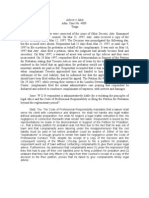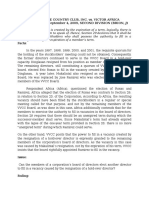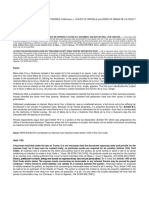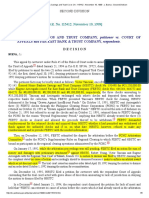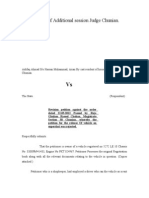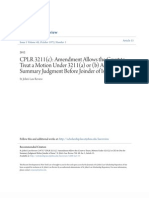100%(2)100% found this document useful (2 votes)
1K viewsRivera-Pascual v. Sps Lim
Rivera-Pascual v. Sps Lim
Uploaded by
Teoti Navarro ReyesThis case involves a land dispute between Maria Consolacion Rivera-Pascual and the Spouses Lim over a parcel of land in Valenzuela City. The Regional Agrarian Reform Adjudicator ruled in favor of Rivera-Pascual, but the Decision was reversed by the Department of Agrarian Reform Adjudication Board. Rivera-Pascual appealed to the Court of Appeals, but her petition was denied due to technical deficiencies, such as her counsel failing to indicate his MCLE Certificate of Compliance number and issues with the jurat. The Supreme Court affirmed the denial, stating that absent a valid explanation, procedural rules cannot be disregarded through claims of inadvertence or liberal construction. While the
Copyright:
© All Rights Reserved
Available Formats
Download as DOCX, PDF, TXT or read online from Scribd
Rivera-Pascual v. Sps Lim
Rivera-Pascual v. Sps Lim
Uploaded by
Teoti Navarro Reyes100%(2)100% found this document useful (2 votes)
1K views2 pagesThis case involves a land dispute between Maria Consolacion Rivera-Pascual and the Spouses Lim over a parcel of land in Valenzuela City. The Regional Agrarian Reform Adjudicator ruled in favor of Rivera-Pascual, but the Decision was reversed by the Department of Agrarian Reform Adjudication Board. Rivera-Pascual appealed to the Court of Appeals, but her petition was denied due to technical deficiencies, such as her counsel failing to indicate his MCLE Certificate of Compliance number and issues with the jurat. The Supreme Court affirmed the denial, stating that absent a valid explanation, procedural rules cannot be disregarded through claims of inadvertence or liberal construction. While the
Original Description:
cc cvcv
Original Title
(006) Rivera-Pascual v. Sps Lim
Copyright
© © All Rights Reserved
Available Formats
DOCX, PDF, TXT or read online from Scribd
Share this document
Did you find this document useful?
Is this content inappropriate?
This case involves a land dispute between Maria Consolacion Rivera-Pascual and the Spouses Lim over a parcel of land in Valenzuela City. The Regional Agrarian Reform Adjudicator ruled in favor of Rivera-Pascual, but the Decision was reversed by the Department of Agrarian Reform Adjudication Board. Rivera-Pascual appealed to the Court of Appeals, but her petition was denied due to technical deficiencies, such as her counsel failing to indicate his MCLE Certificate of Compliance number and issues with the jurat. The Supreme Court affirmed the denial, stating that absent a valid explanation, procedural rules cannot be disregarded through claims of inadvertence or liberal construction. While the
Copyright:
© All Rights Reserved
Available Formats
Download as DOCX, PDF, TXT or read online from Scribd
Download as docx, pdf, or txt
100%(2)100% found this document useful (2 votes)
1K views2 pagesRivera-Pascual v. Sps Lim
Rivera-Pascual v. Sps Lim
Uploaded by
Teoti Navarro ReyesThis case involves a land dispute between Maria Consolacion Rivera-Pascual and the Spouses Lim over a parcel of land in Valenzuela City. The Regional Agrarian Reform Adjudicator ruled in favor of Rivera-Pascual, but the Decision was reversed by the Department of Agrarian Reform Adjudication Board. Rivera-Pascual appealed to the Court of Appeals, but her petition was denied due to technical deficiencies, such as her counsel failing to indicate his MCLE Certificate of Compliance number and issues with the jurat. The Supreme Court affirmed the denial, stating that absent a valid explanation, procedural rules cannot be disregarded through claims of inadvertence or liberal construction. While the
Copyright:
© All Rights Reserved
Available Formats
Download as DOCX, PDF, TXT or read online from Scribd
Download as docx, pdf, or txt
You are on page 1of 2
Maria Consolacion Rivera-Pascual v.Sps.
Marilyn Lim and George Lim and the Registry
of Deeds of Valenzuela City, G.R. No. 191837, September 19, 2012
Facts:
The present controversy involves a parcel of land located in Valenzuela City registered
under the name of the Spouses Lim (or private respondents). On September 2004, the
petitioner filed before the Office of the Regional Agrarian Reform (RARAD) for Region
IV-A a petition to be recognized as a tenant of a property located in Valenzuela City
against one Deato. At that time, the property was under Deatos name. During the
pendency of the petition, Deato sold the property to Spouses Lim. The sale was
registered on December 2004 leading to the issuance of a TCT in favor of the private
respondents. Thus, the petitioner filed a motion on March 2005 to implead the Spouses
Lim.
On December 2005, the petition was granted by the Regional Adjudicator (RA). The
dispositive portion of the decision includes, inter alia, that the petitioner is the tenant of
the subject land by succession from her deceased father and that she should be
subrogated to the rights of the private respondents. The judgment of the RA became
final. Thus, Consolacion filed a motion for execution to which a writ of execution was
issued by the RA on January 2008. Seven days after, the petitioner filed a petition against
the private respondents and the Registrar of Deeds praying for the issuance of an order
directing Spouses Lim to accept the amount of P10million which she undertook to
tender, declare the property redeemed and cancel the TCT.
RARAD: The petition was given due course by the RA, the dispositive portion of the
decision stating that the property is lawfully redeemed, ordering the private respondents
to accept the amount consigned with the DARAB, execute a deed of redemption in favor
of the petitioner and directing the RD to cancel the TCT registered in the name of the
private respondents and issue a new one in favor of the petitioner.
DARAB: The decision of RARAD was reversed. Consolacion moved for reconsideration
which the DARAB denied.
CA: Consolacion filed a petition for review under Rule 43 of the Rules of Court. The CA
did not give due course to the petition due to the following technical grounds: a) failure
of counsel to indicate in the petition his MCLE Certificate of Compliance or Exemption
Number and b) the jurat of Consolacions verification and certification against nonforum-shopping failed to indicate any competent evidence of Consolacions identity
apart from her community tax certificate.
She moved for reconsideration but was denied.
Issue: WON the petition should be denied due to the unexplained failure to comply with
basic procedural requirements of the Rules of Court.
Held: Yes, the petition should be denied.
Consolacion and her counsel claimed inadvertence and negligence but they did not
explain the circumstances thereof. Absent valid and compelling reasons, the requested
leniency and liberality in the observance of procedural rules appears to be an
afterthought, hence, cannot be granted. The CA saw no compelling need meriting the
relaxation of the rules. Neither did the Court see any.
The Court is aware of the exceptional cases where technicalities were liberally
construed. However, in these cases, outright dismissal is rendered unjust by the presence
of a satisfactory and persuasive explanation. The parties therein who prayed for liberal
interpretation were able to hurdle that heavy burden of proving that they deserve an
exceptional treatment. It was never the Courts intent to forge a bastion for erring
litigants to violate the rules with impunity.
This Court will not condone a cavalier attitude towards procedural rules. It is the duty of
every member of the bar to comply with these rules. They are not at liberty to seek
exceptions should they fail to observe these rules and rationalize their omission by
harking on liberal construction.
While it IS the negligence of Consolacion's counsel that led to this unfortunate result, she
is bound by such.
You might also like
- Law Internship DiaryDocument48 pagesLaw Internship DiaryIshaan Harsh80% (40)
- Petition For Declaration of Nullity of MarriageDocument3 pagesPetition For Declaration of Nullity of MarriageelvinNo ratings yet
- Domingo Vs Aquino 38 SCRA 472Document1 pageDomingo Vs Aquino 38 SCRA 472Katharina Canta75% (4)
- Nakpil V Valdez DigestDocument2 pagesNakpil V Valdez DigestErish Jay Manalang100% (2)
- Manahan v. FloresDocument2 pagesManahan v. FloresGel Maulion67% (3)
- LegalEthicsDigest - Manuel G. Villatuya vs. Atty. Bede S. Tabalingcos, AC 6622 (July 10, 2012)Document2 pagesLegalEthicsDigest - Manuel G. Villatuya vs. Atty. Bede S. Tabalingcos, AC 6622 (July 10, 2012)Lu Cas100% (3)
- 44 Nebreja v. ReonalDocument2 pages44 Nebreja v. ReonalLawdemhar Cabatos100% (1)
- Masmud Vs NLRC and Atty Go DigestDocument2 pagesMasmud Vs NLRC and Atty Go DigestMichael Parreño Villagracia100% (1)
- SABURNIDO vs. MADROÑODocument2 pagesSABURNIDO vs. MADROÑOCistron Exon100% (2)
- GR 159486-88 Estrada V Sandiganbayan 416 SCRA 465 - DigestDocument2 pagesGR 159486-88 Estrada V Sandiganbayan 416 SCRA 465 - DigestErwin Bernardino100% (3)
- Binay-An vs. AddogDocument1 pageBinay-An vs. Addogaudreydql5100% (1)
- MyLegalWhiz Complaint Affidavit AffidavitsDocument1 pageMyLegalWhiz Complaint Affidavit AffidavitsTeoti Navarro ReyesNo ratings yet
- Razon vs. TagitisDocument5 pagesRazon vs. TagitisTeoti Navarro ReyesNo ratings yet
- 9 - Consolacion V Sps LimDocument2 pages9 - Consolacion V Sps LimKriselNo ratings yet
- Vitriolo V Dasig 2003Document2 pagesVitriolo V Dasig 2003Benitez Gherold100% (2)
- 28 Freeman v. Reyes (Dvma)Document2 pages28 Freeman v. Reyes (Dvma)Dan AbaniaNo ratings yet
- Arnado V Adaza: FactsDocument1 pageArnado V Adaza: Factsjetski loveNo ratings yet
- Domingo - ObandoDocument22 pagesDomingo - Obandocooley14No ratings yet
- Camacho Vs PangulayanDocument2 pagesCamacho Vs PangulayanM Azeneth JJNo ratings yet
- Espina vs. Chavez (AC No. 7250, April 20, 2015)Document1 pageEspina vs. Chavez (AC No. 7250, April 20, 2015)Linalyn LeeNo ratings yet
- Agot vs. Atty. RiveraDocument2 pagesAgot vs. Atty. RiveraanalyntaguilingNo ratings yet
- Misamin VS San JuanDocument1 pageMisamin VS San JuanMarkus Tran MoraldeNo ratings yet
- Reyes v. ChiongDocument2 pagesReyes v. ChiongAbbyElbambo100% (1)
- Gonzales Vs Cabucana (2006) (Villaruel)Document2 pagesGonzales Vs Cabucana (2006) (Villaruel)AbbyElbambo100% (1)
- Intestate Estate of The Deceased Luis C. Domingo Vs AquinoDocument1 pageIntestate Estate of The Deceased Luis C. Domingo Vs Aquinotinct100% (1)
- In Re AvecillaDocument2 pagesIn Re AvecillaRidzanna AbdulgafurNo ratings yet
- Stemmerik v. MasDocument1 pageStemmerik v. MasCatherine_Dela_6518100% (1)
- Mercado V Sec. Bank CorpDocument2 pagesMercado V Sec. Bank Corpgoma21No ratings yet
- Felicisimo M. Montano vs. Ibp and Atty. Juan S. Dealca, Ac No. 4215Document3 pagesFelicisimo M. Montano vs. Ibp and Atty. Juan S. Dealca, Ac No. 4215Katharina CantaNo ratings yet
- MARY ANN MATTUS V. ATTY. ALBERT VILLASECA A.C. 7922 October 1, 2013Document2 pagesMARY ANN MATTUS V. ATTY. ALBERT VILLASECA A.C. 7922 October 1, 2013Donna Grace GuyoNo ratings yet
- MANUEL G. VILLATUYA v. ATTY. BEDE S. TABALINGCOSDocument2 pagesMANUEL G. VILLATUYA v. ATTY. BEDE S. TABALINGCOSเจียนคาร์โล การ์เซียNo ratings yet
- Montano vs. IBP, 358 SCRA 1 (2001)Document1 pageMontano vs. IBP, 358 SCRA 1 (2001)Ridzanna Abdulgafur100% (1)
- University of The Philippines College of Law: Block F2021Document2 pagesUniversity of The Philippines College of Law: Block F2021Juno GeronimoNo ratings yet
- Ventura v. Samson (2012) (Sebastian, A.)Document2 pagesVentura v. Samson (2012) (Sebastian, A.)AbbyElbamboNo ratings yet
- Embido v. Pe, Jr. 2013Document2 pagesEmbido v. Pe, Jr. 2013MarianneVitug100% (1)
- Ma. Elena Nebreja Vs Atty ReonalDocument1 pageMa. Elena Nebreja Vs Atty ReonalRose De JesusNo ratings yet
- Piatt V Abordo DigestDocument2 pagesPiatt V Abordo DigestAnonymous ULRHUccECy100% (2)
- Somosot v. PontevedraDocument2 pagesSomosot v. PontevedraCamille BritanicoNo ratings yet
- Digest - Castillo Vda Mijares Vs VillaluzDocument1 pageDigest - Castillo Vda Mijares Vs VillaluzUnknown userNo ratings yet
- Saa v. Ibp-CbdDocument2 pagesSaa v. Ibp-CbdRose De JesusNo ratings yet
- People vs. PinedaDocument2 pagesPeople vs. PinedaJo Ellaine Torres67% (3)
- Ma Luisa Hadjula Vs Atty MadiandaDocument2 pagesMa Luisa Hadjula Vs Atty MadiandaDairen Canlas100% (2)
- A.C No. 6934Document3 pagesA.C No. 6934Dara EstradaNo ratings yet
- Barnachea v. Quiocho - DigestDocument2 pagesBarnachea v. Quiocho - DigestBeatriz VillafuerteNo ratings yet
- LegalEthicsDigest - Amparo Bueno vs. Atty. Ramon A. Rañeses, AC 8383 (December 11, 2012)Document1 pageLegalEthicsDigest - Amparo Bueno vs. Atty. Ramon A. Rañeses, AC 8383 (December 11, 2012)Lu Cas100% (2)
- Cordova V CordovaDocument2 pagesCordova V CordovaPatatas SayoteNo ratings yet
- Genato Vs Silapan Case DigestDocument2 pagesGenato Vs Silapan Case DigestJuris Themis50% (2)
- Junio V Atty GrupoDocument2 pagesJunio V Atty GrupoCarey AntipuestoNo ratings yet
- 60 - Carandang Vs ObminaDocument2 pages60 - Carandang Vs ObminaRavenFox100% (1)
- Legal Ethics Case DigestsDocument5 pagesLegal Ethics Case DigestsTopher OlivaNo ratings yet
- 143 Angalan V DelanteDocument2 pages143 Angalan V DelanteIhna Alyssa Marie SantosNo ratings yet
- Abay v. MontesinoDocument2 pagesAbay v. MontesinoTon Rivera100% (1)
- Barnachea Vs Quicho Rule 16.04Document2 pagesBarnachea Vs Quicho Rule 16.04Zebulun DocallasNo ratings yet
- 2 Rayos vs. Atty. Hernandez - Case DigestDocument2 pages2 Rayos vs. Atty. Hernandez - Case Digestiam McKoyNo ratings yet
- Obando Vs Figueras DigestDocument2 pagesObando Vs Figueras DigestMau TorralbaNo ratings yet
- In Re Avecilla (2011)Document2 pagesIn Re Avecilla (2011)AbbyElbambo100% (1)
- Adecer V AkutDocument1 pageAdecer V AkutRL AVNo ratings yet
- Ramos V Atty ImbangDocument1 pageRamos V Atty ImbangGen Grajo100% (2)
- 81 Crisostomo V NazarenoDocument2 pages81 Crisostomo V Nazarenoluigi vida100% (1)
- Maglente vs. AgcaoiliDocument3 pagesMaglente vs. AgcaoiliDudly RiosNo ratings yet
- 6 Embido v. Pe JRDocument2 pages6 Embido v. Pe JRGenevieve BermudoNo ratings yet
- Rivera-Pascual vs. Sps LimDocument2 pagesRivera-Pascual vs. Sps LimSheila RosetteNo ratings yet
- Lorbes Vs CADocument3 pagesLorbes Vs CARodel Cadorniga Jr.No ratings yet
- Civil Procedure - Part 1 Case DigestDocument4 pagesCivil Procedure - Part 1 Case DigestNyanNo ratings yet
- People vs. Balino, G.R. No. 194833, July 2, 2014Document2 pagesPeople vs. Balino, G.R. No. 194833, July 2, 2014Teoti Navarro ReyesNo ratings yet
- Comparative Matrix and Analysis of LaborDocument4 pagesComparative Matrix and Analysis of LaborTeoti Navarro ReyesNo ratings yet
- Vasquez Vs CADocument1 pageVasquez Vs CATeoti Navarro ReyesNo ratings yet
- Kinser UtiDocument1 pageKinser UtiTeoti Navarro Reyes67% (6)
- Condominium Units For Rent AdDocument1 pageCondominium Units For Rent AdTeoti Navarro ReyesNo ratings yet
- Abubakar Afdal vs. Romeo CarlosDocument3 pagesAbubakar Afdal vs. Romeo CarlosTeoti Navarro ReyesNo ratings yet
- Gamboa Vs Teves 2011Document3 pagesGamboa Vs Teves 2011Teoti Navarro ReyesNo ratings yet
- Weekly Accomplishment Report REYESDocument2 pagesWeekly Accomplishment Report REYESTeoti Navarro ReyesNo ratings yet
- SPEC PRO Case AssignmentDocument5 pagesSPEC PRO Case AssignmentTeoti Navarro ReyesNo ratings yet
- Far East Bank and Trust Company Vs CADocument1 pageFar East Bank and Trust Company Vs CATeoti Navarro Reyes100% (1)
- Retired SP04 Bienvenido Laud vs. People of The Philippines Et Al, G.R. No. 199032Document2 pagesRetired SP04 Bienvenido Laud vs. People of The Philippines Et Al, G.R. No. 199032Teoti Navarro Reyes100% (1)
- Omongan Vs OmiponDocument2 pagesOmongan Vs OmiponTeoti Navarro ReyesNo ratings yet
- Fortune Life Insurance Co., Inc. v. COA, G.R. No. 213525Document3 pagesFortune Life Insurance Co., Inc. v. COA, G.R. No. 213525Teoti Navarro ReyesNo ratings yet
- Bondoc vs. MantalaDocument3 pagesBondoc vs. MantalaTeoti Navarro ReyesNo ratings yet
- Dare Adventure Farm Corporation V CA, Et - AlDocument2 pagesDare Adventure Farm Corporation V CA, Et - AlTeoti Navarro ReyesNo ratings yet
- PD 1866 RA 9516 RA 8294 and EO 522 All inDocument8 pagesPD 1866 RA 9516 RA 8294 and EO 522 All inTeoti Navarro ReyesNo ratings yet
- Aznar vs. Citibank NADocument3 pagesAznar vs. Citibank NATeoti Navarro ReyesNo ratings yet
- Valle Verde Country Club v. AfricaDocument2 pagesValle Verde Country Club v. AfricaTeoti Navarro ReyesNo ratings yet
- Bienvenido Gelisan Vs AldayDocument2 pagesBienvenido Gelisan Vs AldayTeoti Navarro ReyesNo ratings yet
- Procedure For Disbarment of Lawyers The Christian Spiritists v. Atty MangallayDocument8 pagesProcedure For Disbarment of Lawyers The Christian Spiritists v. Atty MangallayTeoti Navarro ReyesNo ratings yet
- Del Monte Corporation vs. CADocument2 pagesDel Monte Corporation vs. CATeoti Navarro ReyesNo ratings yet
- Jason Ivler v. PonceDocument2 pagesJason Ivler v. PonceTeoti Navarro ReyesNo ratings yet
- Cagampang - BusOrg - de La Cruz vs. CADocument1 pageCagampang - BusOrg - de La Cruz vs. CAVina CagampangNo ratings yet
- Go v. UCPB (2004)Document4 pagesGo v. UCPB (2004)mc.rockz14No ratings yet
- Sophia Legis - Evidence ReviewerDocument89 pagesSophia Legis - Evidence ReviewerHanzel Uy VillonesNo ratings yet
- 609 F2d 1101 Potashnick v. Port City Construction Company / Open JuristDocument10 pages609 F2d 1101 Potashnick v. Port City Construction Company / Open JuristRobert Davidson, M.D., Ph.D.100% (2)
- Home Bankers Savings and Trust Co Vs CA - 115412 - November 19, 1999 - J. Buena - Second DivisionDocument6 pagesHome Bankers Savings and Trust Co Vs CA - 115412 - November 19, 1999 - J. Buena - Second DivisionLeizle Funa-FernandezNo ratings yet
- Sab Alones vs. SabalonesDocument2 pagesSab Alones vs. SabalonesTrina RiveraNo ratings yet
- Warranto Filed by Mateo Caasi, A Rival Candidate For The Position ofDocument4 pagesWarranto Filed by Mateo Caasi, A Rival Candidate For The Position oflazzyb0nesNo ratings yet
- GASP Brown LawsuitDocument29 pagesGASP Brown LawsuitKyle Whitmire100% (1)
- Abangan Vs AbanganDocument1 pageAbangan Vs AbanganFebbieKatreenn50% (2)
- Admissibility of Hearsay Evidence in Criminal TrialsDocument29 pagesAdmissibility of Hearsay Evidence in Criminal TrialsKhadar MohammedNo ratings yet
- (G.R. No. 204544, July 03, 2017)Document13 pages(G.R. No. 204544, July 03, 2017)Kristine MagbojosNo ratings yet
- MMDA V Concerned Residents of Manila Bay (Environmental Law)Document3 pagesMMDA V Concerned Residents of Manila Bay (Environmental Law)Kara LorejoNo ratings yet
- SuperdariDocument3 pagesSuperdariMianArshidFarooqNo ratings yet
- Netquote Inc. v. Byrd - Document No. 201Document6 pagesNetquote Inc. v. Byrd - Document No. 201Justia.comNo ratings yet
- US Vs Guinto and R.F. Sugay Co. Vs ReyesDocument2 pagesUS Vs Guinto and R.F. Sugay Co. Vs ReyesZonix LomboyNo ratings yet
- Section 154 of Criminal Code of ProcedureDocument20 pagesSection 154 of Criminal Code of Procedureajay more100% (1)
- Zambia High Court Judgement - The People Vs Fredrick Chiluba Faustin Kabwe and Aaron ChunguDocument17 pagesZambia High Court Judgement - The People Vs Fredrick Chiluba Faustin Kabwe and Aaron ChunguMwaba PhiriNo ratings yet
- 001 - G.R. No. 193507Document2 pages001 - G.R. No. 193507masterlazarusNo ratings yet
- l1.2 PH AmusementDocument1 pagel1.2 PH AmusementKDNo ratings yet
- CPLR 3211 (C) - Converting Motion To Dismiss To Motion For Summary JudgmentDocument2 pagesCPLR 3211 (C) - Converting Motion To Dismiss To Motion For Summary JudgmentbonweiNo ratings yet
- 30-1061-Motion Court Cover SheetDocument2 pages30-1061-Motion Court Cover SheetMitchNo ratings yet
- TempDocument6 pagesTempJayant KarnNo ratings yet
- Case Reference No., Date: He Did Not Deliver Such AmbulanceDocument2 pagesCase Reference No., Date: He Did Not Deliver Such Ambulancekjhenyo218502No ratings yet
- Lipana vs. Development Bank of The Philippines DigestDocument1 pageLipana vs. Development Bank of The Philippines DigestJoseph Macalintal100% (1)
- Layugan vs. IAC Torts-Vicarious Liability of Owner of A TruckDocument2 pagesLayugan vs. IAC Torts-Vicarious Liability of Owner of A TruckRoxanne JurialNo ratings yet
- United States v. William Bentvena, William Struzzieri and Samuel Monastersky, 357 F.2d 58, 2d Cir. (1966)Document7 pagesUnited States v. William Bentvena, William Struzzieri and Samuel Monastersky, 357 F.2d 58, 2d Cir. (1966)Scribd Government DocsNo ratings yet
- Ramones-vs-Spouses-Guimoc-DigestDocument3 pagesRamones-vs-Spouses-Guimoc-DigestShaira Mae CuevillasNo ratings yet
- 2014-2017 Bar TaxationDocument41 pages2014-2017 Bar TaxationLR F0% (1)
























































